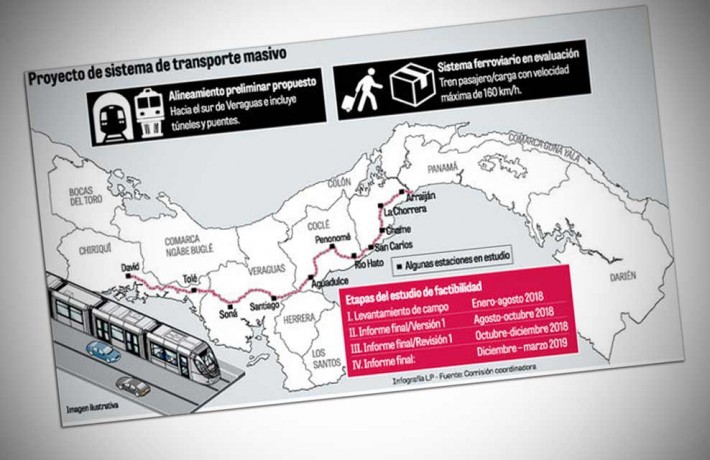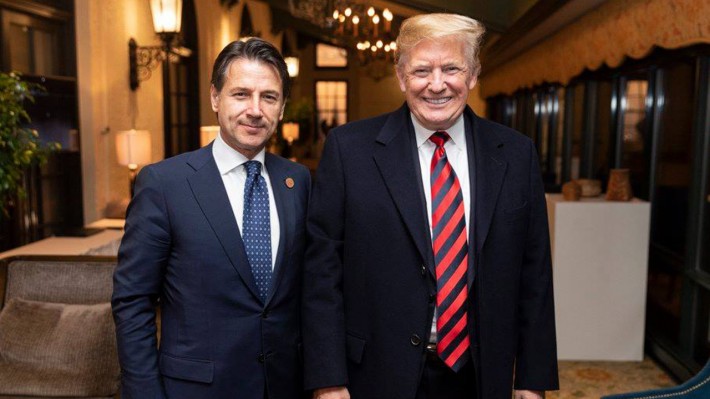The meeting today in Geneva has been played down by both sides. Yet, the fact they are meeting is significant. It comes in the midst of worsening relations between the U.S. and Russia. And it follows a not-fully successful effort by the Anglo-American geopolitical War Hawks to pull the “Alliance of Democratic States” into an agreement for heightened confrontation with Russia and China. While some of the rhetoric was harsh, with wild accusations against both states, it is also clear that not everyone was buying into the idea that more sanctions and bluster against them would accomplish anything, especially when no real evidence backing the charges against Putin and Xi has been presented. In the absence of a solid front in favor of heightened confrontation against Russia and China, is it possible that an actual dialogue might begin?
President Juan Carlos Varela presided over a ceremony Friday for the release of China Railway Design Corporation’s feasibility study on the Panama City-David high-speed railway line agreed upon as part of Panama’s participation in the Belt and Road Initiative. The study found that building the proposed 391.3 km railway from the capital to David, a city near the Costa Rican border, is economically and, as the President emphasized, socially viable—and that it is feasible to extend it into Central America.

The railroad will provide “unprecedented integration of the country, and will empower the country’s logistical platform,” Varela said at the ceremony. The study took into consideration its future extension into Costa Rica, which would “facilitate trade of products between our [Central American] countries, which face great challenges in the area of logistics,” he stressed.
“Such a railway has been the dream of Panamanian leaders for 100 years, and therefore I hope that future leaders will take it up and make it a reality, always thinking of Panama first,” Varela added.
Panama will elect a new President on May 5, and Varela had previously announced that it will be up to his successor to undertake the project. By ensuring the feasibility study was released with proper promotion now, Varela is placing Panama’s participation in the Belt and Road, with the great potential it represents for transforming the country’s poorer regions, at the center of that campaign. (He cannot run again because of term limits.)
The CRDC, assisted by Panamanian government agencies, universities and private consulting companies, estimates that it will take six years to complete the railway, at a cost of $4.1 billion, involving 6,000 employees, direct and indirect, to build it, and 2,900 to operate and maintain it once built.
Beethoven’s Sense of Humor Part 2: “To beat, or not to beat.”
Notes By Fred Haight
In part 1 of Beethoven’s humor, we wrote about “Rage of a Lost Penny”. Today, we talk about the humor in Beethoven’s 8th symphony.
Johann Nepomuk Maelzel tried his hand at Artificial Intelligence about two centuries ago. It did not work out so well for him. In 1821, he brought an automaton chess player called “the Turk” to the United States and toured widely with it, claiming to have invented it and that the “automaton” had the intelligence to regulate its moves. This fraud was later exposed by Edgar Allan Poe in an essay. It turned out that his automatic chess player contained a man hidden inside it (picture below). The machine was in fact invented by Wolfgang von Kempelen and bamboozled the public for decades before being discovered.
Maelzel also claimed to have invented the metronome. Actually, he did not invent that either.
In 1813, Maelzel encouraged Beethoven to compose what could possibly be his worst piece, “Wellington’s Victory”, which celebrates Wellington’s military victory over Napoleon. Maelzel laid out all of the parameters and special effects to make it sound like a battle, including quotes of “Rule Britannia.” Performances featured interludes by Maelzel’s automaton trumpeter and his Panharmonikon, an automatic orchestra.
Despite the composition’s commercial success, Beethoven ended up suing Maelzel when he tried to pass the work off as his own. Beethoven described him as “a rude, churlish man, entirely devoid of education or cultivation.”
Listen to this canon that maked fun of Maelzel and his metronome.
These days, scholars who love to spoil all the fun, claim that the canon was actually written by Beethoven’s aide-de-camp, Anton Schindler, and passed off as praise for Maelzel by Beethoven. That does not quite make sense. Here are the words of the canon:
Ta ta ta, dear Maelzel
ta ta ta, live well, very well
ta ta ta, you Banner of Time
ta ta ta, you great metronome.
ta ta ta ta ta ta.
Faint praise indeed. Besides, Schindler was very critical of taking Beethoven’s metronome markings literally, because he personally had experienced Beethoven change his mind about what tempo his works should be taken at. Beethoven alleged comment to Schindler: “No more metronome! Anyone who can feel the music right does not need it; and for anyone who can’t, nothing is of any use; he runs away with the whole orchestra anyway.”
Now to Beethoven’s 8th symphony. The second movement resembles this canon. The same scholars argue that the symphony came before Maelzel patented his metronome, so it could not be a parody of it.
Give us a break! In the symphony, Beethoven is clearly making fun of a too strict tempo. But we ask you, the audience to listen and tell us what you think!
Interviews with Helga Zepp-LaRouche and Jacques Cheminade appeared on a newscast by CCTV-13 reporting on U.S. reactions to the just-concluded National People’s Congress. CCTV journalist Wang Guang reported on the reaction of U.S. think tanks to the ideas presented during the Two Sessions with regard to U.S.-China trade and the Belt and Road Initiative.
The broadcast then shifted to an interview done with Helga at the Morristown Schiller Institute conference. Zepp-LaRouche said:
“I personally think it is the most important strategic initiative, because it is a concept with which you can overcome geopolitics. Geopolitics has been the cause of two wars in the 20th Century, and the idea that you can not have blocs of countries or nations against nations, but that you have what Xi Jinping always calls the ‘community of the shared future of humanity,’ that you put the one humanity first, is a strategic concept which allows you to overcome the divisions which existed in previous centuries.”
This was followed by Cheminade, who said,
“The Chinese way is to a world integration through common development, what President Xi Jinping calls a ‘win-win’ system. So that is a future. The Chinese want a world development. They don’t want to impose their model, but they don’t want the other models to impose upon them.”
Helga’s clip was also aired on CCTV Plus, an English-language CCTV site, on a program entitled “Foreign Experts Applaud Development Concepts.”
Beethoven’s “Leichte Sonaten” composed in 1795-76 but not released publicly until 1805 are often studied by students.
The Opus 49 “Leichte Sonaten” (light sonatas) are only known today because Kaspar van Beethoven, one of the composer’s brothers, decided on his own to present them for publication in 1805, fully ten years after they had been composed. They are both two-movement works of great charm, popular among students and professionals alike.
Here Wilhelm Kempff performs Beethoven’s Sonata #19, Opus 49 no. 1.
Instead of engaging the leaders of Russia and China in a serious deliberation on what to do about the multiplicity of crises affecting the world, the G7 and NATO leaders put forward a series of unserious, if not downright lunatic proposals, during their confabs over the last days. Their proposals for global infrastructure and battling the COVID pandemic were not serious, but instead would continue the policies which have left infrastructure — including that of public health — incapable of serving the needs of nations and their people. As for their strategic communique, it is more of the same false accusations against Russia and China, to justify military buildup and geopolitical confrontation. Where are the statesmen and women, when they’re needed? They will be at the Schiller Institute online conference, June 26-7. Join us!
Iraq is seeking to build eight nuclear power plants by 2030, to eliminate its endemically bad electricity footprint, a product of destruction by the Children of Satan — most recently of George Bush’s 2003 Iraq War destruction, but going as far back as the 1981 bombing of the (almost complete) Osirak nuclear reactor by Israel. The oil-rich country, OPEC’s second-largest producer, is seeking to go nuclear partly under pressure from global green de-carbonizers, who are trying to raze all oil production from the planet.
According to {Bloomberg News}, who interviewed Kamal Hussain Latif, chairman of the Iraqi Radioactive Sources Regulatory Authority, “Iraq is seeking to build eight reactors capable of producing about 11 gigawatts, [and seeking] funding from prospective partners for the $40 billion plan and pay back the costs over 20 years.” Iraq has been in contact with both Russian and South Korean officials about a deal, they say.
Detailing the sorry state of electricity in Iraq, {Bloomberg} notes that Iraq currently has 18.4 GW capacity, which includes 1.2 GW imported from Iran. They estimate “normal” demand to be 28 GW — exceeding 30 GW in the “torrid” summer months. By 2030, Iraq’s demand is expected to rise to 42 GW, so the 11GW nuclear that they are seeking is right in step with demand.
The bright future with nuclear fission and fusion power will be discussed at the upcoming Schiller Institute conference.
For the Common Good of all People, not the Rules Benefiting the Few!
International Schiller Institute/ICLC online conference, June 26/ 27, 2021
Beethoven and Tragedy: The Coriolan Overture
Notes By Fred Haight
We have already talked about Beethoven’s sense of the heroic; and the power and optimism expressed in his Third Symphony, his only opera Fidelio, and the Egmont Overture.
However, an important part of trying to create a positive outcome for society, involves the study of tragedy. This does not refer to the way in which people use the term today, such as a natural disaster, but what happens when the flaws in both a leader and a society result in failure, or worse, betrayal?
Heinrich Joseph von Collin wrote his play, Coriolan, in 1804, the year that Napoleon crowned himself as Emporer. That same year, Beethoven scratched out the dedication of his Third Symphony to Bonaparte, lamenting that now Napoleon would become just another tyrant, and trample on the rights of men. That same year, Schiller premiered his last play, Wilhelm Tell, celebrating the ancient triumph of ordinary Swiss people over the threat of subjugation by the Hapsburg Empire.
In the next year, 1805, the French army occupied Vienna, and many of the city’s leaders left. Von Collin was an opponent of the French occupation, but also seems to have served as some sort of diplomatic liaison. In 1807, Coriolan was performed with a prelude composed by Ludwig van Beethoven. Von Collin was a classicist, familiar not only with Shakespeare, but with the ancient Greeks and Romans. Von Collin’s play is a Germanic rewrite of the ancient story of Gaius Marcius Corialanus, which Shakespeare also wrote about, in his play Coriolanus. We will use Shakespeare’s play Coriolanus, supplemented by the historical writings of Livy and Plutarch, to give a brief account of this tragedy of a flawed military leader and a flawed Roman Republic.
Gaius Marcius Coriolanus was promoted to General after showing great personal courage in defeating the Volscians at the city of Corioli, and was given the honorary name Coriolanus. He made an effort to seek higher political office, but had a deep flaw, in that he DESPISED the ordinary people—the plebeians. That was not just Coriolanus. There was a severe overall divide in the Roman Empire between the plebeians and the patricians. He had to win their approval to be promoted, but he absolutely refused to obey the standard ritual of showing them his war wounds. Worse, he was a speculator, who hoarded grain even while the people starved. He insulted the people, calling them “crows pecking at eagles”. As a result, Coriolanus, the war hero, was exiled from Rome. His wounded ego was so enraged that he went to his old enemies, The Volscians, and offered to lead their army in an attack on Rome. They marched together. The Romans were so freaked out that as Coriolanus and the Volscians approached, they sent Coriolanus’ mother (who had far too much influence on him), and his wife and children to talk him out of it. He relented. Thus, he became seen as a traitor by both the Romans AND the Volscians, who were at the gates of Rome. In Shakespeare’s play, he was murdered. In the Collin, he committed suicide.
If you read Shakespeare’s Julius Caesar, you see the same problem within the Roman Republic: a huge rift between the people and those in power—the plebeians and the patricians. The patricians had no respect for the plebeians, and the plebeians were fickle, having had no sense of loyalty to the patricians. In 1804, this history would be resonating in people’s minds, as the French Revolution descended into barbarism, with the “sans culottes” decapitating the aristocracy in droves, and as a great general, who promised to liberate the people, became a tyrant.
This performance of the Coriolan Overture is conducted by Wilhelm Furtwangler, recorded in 1943, as Germany and the world experienced an even worse tragedy.
The ongoing battle between two paradigms was center stage in Italy this week, as the conference cosponsored by Movisol and the Lombard Region, demonstrated the potential for the Belt-and-Road Initiative (BRI) to break the power of the London-run geopoliticians in Europe. Helga Zepp LaRouche’s report on the conference, at which she spoke, and was joined by Michele Geracci, an Undersecretary of the Italian Finance Ministry and head of the government’s China Task Force, highlighted the significance of the upcoming trip of Xi Jinping to Italy, and the signing on an MOU for Italy to join the BRI. If Italy and fifteen other EU member nations can participate, for mutual benefit, with the BRI, what of France and Germany? Why are the EU bureaucrats and the London neo-liberals so distressed by this development?
Contrast this potential to the hysteria coming from EU bureaucrats, from NATO officials such as Gen. Scaparroti, and from U.S. Secretary of State Pompeo, which is part of a neocon contingent trying to rein Trump in. Helga presents a clear picture of how the neocons are moving, aiming at sabotaging the trade talks with China, denuclearization of North Korea, and pushing for regime change in Venezuela, to force Trump to move away from his campaign promises.
She appealed to viewers to use the mobilization to exonerate Lyndon LaRouche as a means of bringing down the war party, which is continuing its efforts to destroy the potential of the Trump presidency.
The first 400,000 doses of the Astra-Zeneca vaccine produced by Argentina and packaged by Mexico were delivered by the Mexican Air Force over the weekend to Bolivia, Paraguay and Belize: 150,000 each for the first two; 100,000 for the latter, much smaller country. Another 811,000 doses, now ready for injection, were shipped back on commercial airlines to Argentina, for its use. Mexican Foreign Ministry officials report some 500,000 vaccines should be shipped to El Salvador, Honduras and Guatemala “shortly,” and others after that.
Accompanying the vaccines to La Paz, Mexican Deputy Foreign Minister for Multilateral Affairs and Human Rights declared in a joint press statement with Bolivian Foreign Minister Rogelio Mayta, that “we are one people, one community,” and we are most happy that we are able to help. Mayta agreed that “we are a single brotherhood.” He thanked Mexico, assuring Delgado that when Mexico needs help,Bolivia will be there for Mexicans, too.
Mexico’s Deputy Foreign Secretary for Latin America and the Caribbean, Maximilian Reyes Zúñiga, reported in a June 13 {El Economista} oped he headlined “Latin American Solidarity; A Diplomacy of Results,” that Mexico will be sharing the Chinese Cansino vaccine which it is preparing to produce and its own “Patria” vaccine, now in Phase II trials, with the rest of the region. He then delivered a pointed message to those like the Biden administration and other G-7 nations who have been ignored the needs of other nations:
“We are not just fulfilling a commitment made. This also entails our vision of solidarity with Latin America and the Caribbean, a diplomacy of results which places the common good before the egotistical interests which often dominate international relations. By helping others, we help ourselves. Mexico trusts in the power of leading by example, and that our actions will benefit not only the people who receive the vaccines, but that they will be a powerful image so that other countries do the same and also act in solidarity.”
The need for a world health system will be discussed at the upcoming Schiller Institute conference.
For the Common Good of all People, not the Rules Benefiting the Few!
International Schiller Institute/ICLC online conference, June 26/ 27, 2021
















